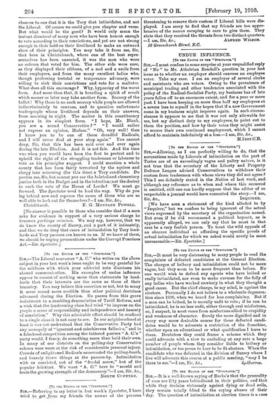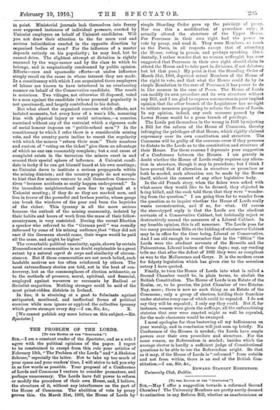[To Tirs EDITOR Or EMI " SPECTATOR." J
SIR,—It is a well-known saying of Burke's that the generality of men are fifty years behindhand in their politics, and that while they declaim virtuously against dying or tlistd evils, they remain totally blind to the crying abuses of their day. The question of intimidation at election times is a case
in point. Ministerial journals lash themselves into frenzy . over supposed instances of individual pressure, exerted by Unionist employers on behalf of Unionist candidates. Will you not draw their attention to the far more real and serious intimidation exerted in the opposite direction by organised bodies of men P For the influence of a master depends entirely on his popularity ; he may lead, but he cannot drive. The slightest attempt at dictation is rightly resented by the wage-earner and by the class to which be belongs, and is emphatically condemned by public opinion. Efforts—rare and spasmodic efforts—at undue influence simply recoil on the cause in whose interest they are made. In a constituency with which I am acquainted three employers of labour are known to have interfered in an overbearing manner on behalf of the Conservative candidate. The result is notorious. Two villages, not otherwise ill disposed, voted to a man against the candidate (whose personal popularity is not questioned), and largely contributed to his defeat.
But what about the organised coercion which affects, not isolated moments, but every hour of a man's life, menacing him with physical injury or social ostracism,—a coercion exercised without any of the restraint which a rigorous code of social honour imposes on " public-school men" P In the constituency to which I refer there is a considerable mining vote, and the country parts incline to resent the regularity with which the miners " return their man." Their numbers and custom of "voting on the ticket" give them an advantage . of which no one can reasonably complain; but a real cause of complaint exists in the terrorism the miners exert in and around their special sphere of influence. A Unionist candi- date is lucky if he can get himself heard at his own meetings ; no Unionist dares to institute a serious propaganda within the mining districts ; and the country people do not scruple to hint that few miners venture to call themselves Conserva- tives "because accidents so easily happen underground." In the immediate neighbourhood men fear to applaud at a Unionist meeting ; if they do so they are marked men, and live in terror of the powerful and lawless youths, whose gangs can break the windows of the poor and burn the hayricks of the richer. This tyranny is all the more serious because the outlook of the mining community, isolated by their habits and hours of work from the mass of their fellow- countrymen, is very restricted. During the recent Election a speaker who referred to the "German peril" was roundly informed by some of his mining audience that "they did not care if the Germans should come, their wages would be paid all the same, and might be higher."
The remarkable political unanimity, again, shown by certain Nonconformist communities is no doubt explainable to a great extent by a natural esprit de corps and similarity of circum- stances. But if these communities are not much belied, such laudable motives are too often reinforced by others. The most extraordinary stories are told, not in the heat of con- troversy, but as the commonplaces of election arithmetic, as to the methods of pressure, moral, spiritual, and financial, employed against waverers or recusants by Radical or Socialist majorities. Nothing stronger could be said of the most priest-ridden districts in Ireland.
In fine, it is straining at a gnat to fulminate against antiquated, moribund, and ineffectual forms of political coercion while men ignore or applaud the collective tyranny
which grows stronger every day.—I am, Sir, &c., X. [We cannot publish any more letters on this subject.—En. Spectator.]









































 Previous page
Previous page